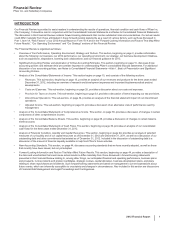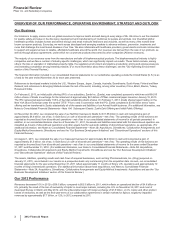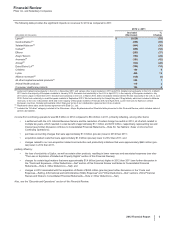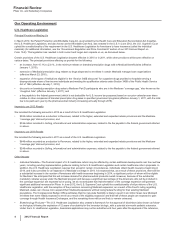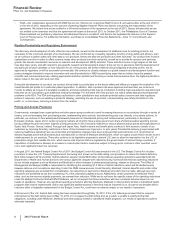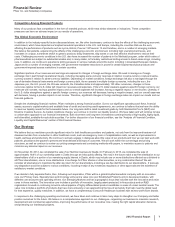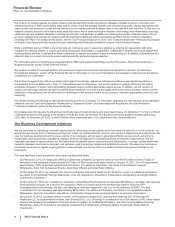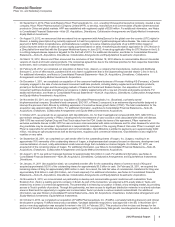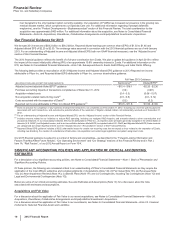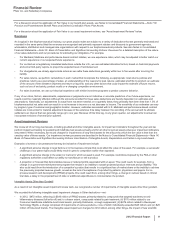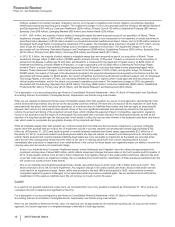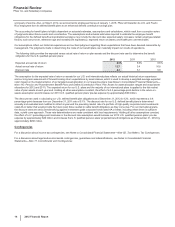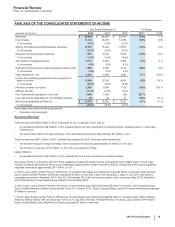Pfizer 2012 Annual Report Download - page 6
Download and view the complete annual report
Please find page 6 of the 2012 Pfizer annual report below. You can navigate through the pages in the report by either clicking on the pages listed below, or by using the keyword search tool below to find specific information within the annual report.
Financial Review
Pfizer Inc. and Subsidiary Companies
2012 Financial Report
5
innovator biologic. The U.S. Food and Drug Administration (FDA) is responsible for implementation of the legislation, which will require
the FDA to address such key topics as the type and extent of data needed to establish biosimilarity; the data required to achieve
interchangeability compared to biosimilarity; the naming convention for biosimilars; the tracking and tracing of adverse events; and the
acceptability of data using a non-U.S. licensed comparator to demonstrate biosimilarity and/or interchangeability with a U.S.-licensed
reference product. The FDA has begun to address some of these issues with the February 2012 release of three draft guidance
documents. Specifically, the FDA has clarified that biosimilar applicants may use a non-U.S. licensed comparator in certain studies to
support a demonstration of biosimilarity to a U.S.-licensed reference product. If competitors are able to obtain marketing approval for
biosimilars referencing our biotechnology products, our biotechnology products may become subject to competition from biosimilars, with
attendant competitive pressure, and price reductions could follow. Expiration or successful challenge of applicable patent rights could
trigger this competition, assuming any relevant exclusivity period has expired. As part of our business strategy, we are developing
biosimilar medicines using our expertise in biologics and our regulatory, commercial and manufacturing strengths. As such, a better-
defined biosimilars approval pathway will assist us in pursuing approval of our own biosimilar products in the U.S.
The Loss or Expiration of Intellectual Property Rights
As is inherent in the biopharmaceutical industry, the loss or expiration of intellectual property rights can have a significant adverse effect on our
revenues. Many of our products have multiple patents that expire at varying dates, thereby strengthening our overall patent protection.
However, once patent protection has expired or has been lost prior to the expiration date as a result of a legal challenge, we lose exclusivity
on these products, and generic pharmaceutical manufacturers generally produce similar products and sell them for a lower price. This price
competition can substantially decrease our revenues for products that lose exclusivity, often in a very short period of time. While small
molecule products are impacted in such a manner, biologics currently have additional barriers to entry related to the manufacture of such
products and, unlike small molecule generics, biosimilars are not necessarily identical to the reference products. Therefore, generic
competition with respect to biologics may not be as significant. A number of our current products are expected to face significantly increased
generic competition over the next few years.
Our financial results in 2012 and our financial guidance for 2013, as applicable, reflect the impact of the loss of exclusivity of various products
and the expiration of certain alliance product contract rights discussed below (see the “Our Financial Guidance for 2013” section of this
Financial Review). Specifically:
• Lipitor in the U.S.––We lost exclusivity for Lipitor in the U.S. in November 2011. The entry of multi-source generic competition in the U.S.
began in May 2012, with attendant increased competitive pressures. Through the end of 2011, sales of Lipitor in the U.S. were reported
in our Primary Care business unit. Beginning in 2012, sales of Lipitor in the U.S. were reported in our Established Products business unit.
Lipitor in international markets—Lipitor lost exclusivity in Japan in June 2011 (with generic competition occurring in November 2011),
Australia in April 2012 and most of developed Europe in March 2012 and May 2012. In Europe, Japan and Australia, Lipitor now faces
multi-source generic competition. In other international markets, Lipitor has lost exclusivity in certain countries and will lose exclusivity at
various times in other countries.
Prior to loss of exclusivity, sales of Lipitor in each market except for those in Emerging Markets, are reported in our Primary Care
business unit. Typically, as of the beginning of the fiscal year following loss of exclusivity in a market, sales of Lipitor in that market,
except for those in Emerging Markets, are reported in our Established Products business unit. Sales of Lipitor in the U.S. and Japan have
been reported in our Established Products business unit since January 1, 2012, and sales of Lipitor in developed Europe began to be
reported in our Established Products business unit on January 1, 2013.
• Other recent loss of exclusivity impacts—In the U.S., we lost exclusivity for Vfend tablets in February 2011, for Xalatan in March 2011 and
for Geodon in March 2012. The basic U.S. patent (including the six-month pediatric exclusivity period) for Protonix expired in January
2011. The basic patent for Vfend tablets in Brazil expired in January 2011. We lost exclusivity for Aromasin in the U.S. in April 2011, in the
majority of European markets in July 2011 and in Japan in November 2011. We lost exclusivity for Xalatan and Xalacom in the majority of
European markets in January 2012. We lost exclusivity for Aricept in the majority of European markets in February 2012 and April 2012.
Caduet lost exclusivity in the U.S. in November 2011 and in the majority of European markets in March and May 2012. We lost exclusivity
in the U.S. in September 2012 for Revatio tablet, and in June 2012 for Detrol IR. Detrol lost exclusivity in most European markets in
September 2012.
In addition, we expect to lose exclusivity for various other products in various markets over the next few years. For additional information,
including with regard to the expiration of the patents for various products in the U.S., European Union (EU) and Japan, see the “Patents and
Intellectual Property Rights” section of our 2012 Annual Report on Form 10-K.
We will continue to aggressively defend our patent rights whenever we deem appropriate. For a discussion of certain recent developments
with respect to patent litigation, see Notes to Consolidated Financial Statements—Note 17. Commitments and Contingencies.
In Alliance revenues, we expect to be negatively impacted by the following over the next few years:
• Aricept—Our rights to Aricept in Japan returned to Eisai Co., Ltd. in December 2012. We expect to lose exclusivity for the Aricept 23mg
tablet in the U.S. in July 2013.
• Spiriva—Our collaboration with Boehringer Ingelheim (BI) for Spiriva expires on a country-by-country basis between 2012 and 2016,
including the expiration in certain EU markets and Canada and Australia in 2012, which adversely impacted our 2012 results. We expect
to experience a graduated decline in revenues from Spiriva through 2016.
• Enbrel—Our U.S. and Canada collaboration agreement with Amgen Inc. for Enbrel will expire in October 2013. While we are entitled to
royalties for 36 months thereafter, we expect that those royalties will be significantly less than our current share of Enbrel profits from
U.S. and Canada sales. Outside the U.S. and Canada, our exclusive rights to Enbrel continue in perpetuity.


